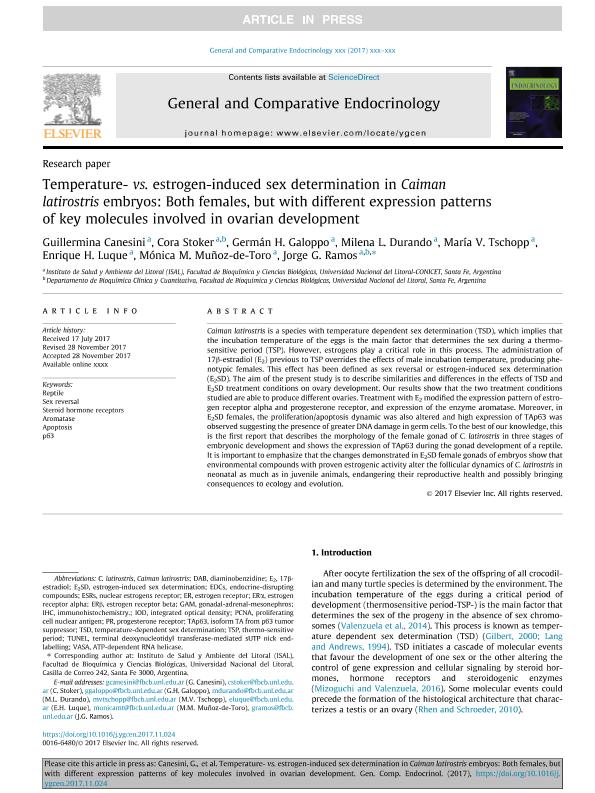Artículo
Temperature- vs. estrogen-induced sex determination in Caiman latirostris embryos: Both females, but with different expression patterns of key molecules involved in ovarian development
Canesini, Guillermina ; Stoker, Cora
; Stoker, Cora ; Galoppo, Germán Hugo; Durando, Milena de Lourdes
; Galoppo, Germán Hugo; Durando, Milena de Lourdes ; Tschopp, María Virginia
; Tschopp, María Virginia ; Luque, Enrique Hugo
; Luque, Enrique Hugo ; Muñoz de Toro, Monica Milagros; Ramos, Jorge Guillermo
; Muñoz de Toro, Monica Milagros; Ramos, Jorge Guillermo
 ; Stoker, Cora
; Stoker, Cora ; Galoppo, Germán Hugo; Durando, Milena de Lourdes
; Galoppo, Germán Hugo; Durando, Milena de Lourdes ; Tschopp, María Virginia
; Tschopp, María Virginia ; Luque, Enrique Hugo
; Luque, Enrique Hugo ; Muñoz de Toro, Monica Milagros; Ramos, Jorge Guillermo
; Muñoz de Toro, Monica Milagros; Ramos, Jorge Guillermo
Fecha de publicación:
04/2018
Editorial:
Academic Press Inc Elsevier Science
Revista:
General and Comparative Endocrinology
ISSN:
0016-6480
Idioma:
Inglés
Tipo de recurso:
Artículo publicado
Clasificación temática:
Resumen
Caiman latirostris is a species with temperature dependent sex determination (TSD), which implies that the incubation temperature of the eggs is the main factor that determines the sex during a thermo-sensitive period (TSP). However, estrogens play a critical role in this process. The administration of 17β-estradiol (E2) previous to TSP overrides the effects of male incubation temperature, producing phenotypic females. This effect has been defined as sex reversal or estrogen-induced sex determination (E2SD). The aim of the present study is to describe similarities and differences in the effects of TSD and E2SD treatment conditions on ovary development. Our results show that the two treatment conditions studied are able to produce different ovaries. Treatment with E2 modified the expression pattern of estrogen receptor alpha and progesterone receptor, and expression of the enzyme aromatase. Moreover, in E2SD females, the proliferation/apoptosis dynamic was also altered and high expression of TAp63 was observed suggesting the presence of greater DNA damage in germ cells. To the best of our knowledge, this is the first report that describes the morphology of the female gonad of C. latirostris in three stages of embryonic development and shows the expression of TAp63 during the gonad development of a reptile. It is important to emphasize that the changes demonstrated in E2SD female gonads of embryos show that environmental compounds with proven estrogenic activity alter the follicular dynamics of C. latirostris in neonatal as much as in juvenile animals, endangering their reproductive health and possibly bringing consequences to ecology and evolution.
Palabras clave:
Apoptosis
,
Aromatase
,
P63
,
Reptile
,
Sex Reversal
,
Steroid Hormone Receptors
Archivos asociados
Licencia
Identificadores
Colecciones
Articulos(ISAL)
Articulos de INSTITUTO DE SALUD Y AMBIENTE DEL LITORAL
Articulos de INSTITUTO DE SALUD Y AMBIENTE DEL LITORAL
Citación
Canesini, Guillermina; Stoker, Cora; Galoppo, Germán Hugo; Durando, Milena de Lourdes; Tschopp, María Virginia; et al.; Temperature- vs. estrogen-induced sex determination in Caiman latirostris embryos: Both females, but with different expression patterns of key molecules involved in ovarian development; Academic Press Inc Elsevier Science; General and Comparative Endocrinology; 259; 4-2018; 176-188
Compartir
Altmétricas



